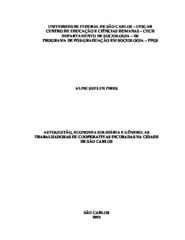Autogestão, Economia Solidária e gênero: as trabalhadoras de cooperativas incubadas na cidade de São Carlos
Resumen
Since the end of the nineteenth century, when they started to become popular, cooperatives are generating important debates. From the 70's, with the crisis of the Fordist production and the restructuring of production in the world, with the unemployment s growth and the loss of social rights linked to the formal work, the cooperativism resurfaces now, renovated as a alternative proposal of "other economy" within capitalism and as a possible overcoming. We analyzed the perception of workers in Solidarity Economy s cooperatives. We tried to see how the workers understand the meaning of self-management, how she(he) internalizes the ideas proposed by the Solidarity Economy s movement. At the same time, we decided to analyze gender relations in the cooperatives studied, which are formed mostly of women, and if the involvement with the proposal resulted in changes in daily work and home life. We investigated workers of projects of the Technological Incubator of Popular Cooperatives of the Federal University of São Carlos. The research studied three cooperatives in the city of São Carlos through the techniques of interviews and observation. The results show a gap between the actual practices and the movement s proposals, which indicates the character "under construction" of the Solidarity Economy in Brazil. Gender relations have not changed, remaining the same of the ordinary companies.
